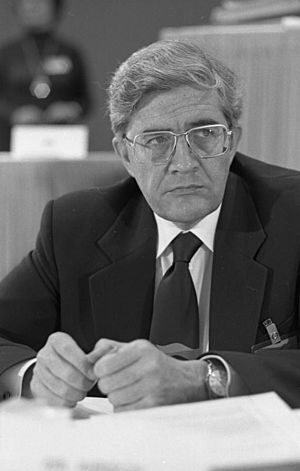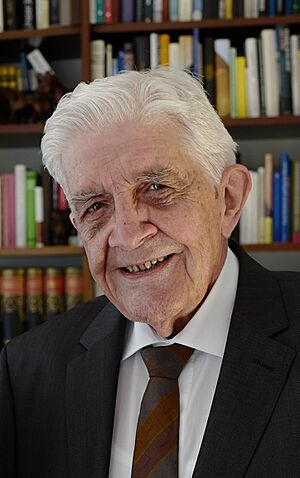Burkhard Hirsch facts for kids
Quick facts for kids
Burkhard Hirsch
|
|
|---|---|
 |
|
| Vice President of the Bundestag (on proposal of the FDP-group) |
|
| In office 10 November 1994 – 26 October 1998 |
|
| Preceded by | Dieter-Julius Cronenberg |
| Succeeded by | Hermann Otto Solms |
| Member of the Bundestag | |
| In office 1980–1998 |
|
| Minister of the Interior of North Rhine-Westphalia | |
| In office 28 May 1975 – 4 June 1980 |
|
| Preceded by | Willi Weyer |
| Succeeded by | Herbert Schnoor |
| Member of the German Bundestag | |
| In office 1972 – 28 May 1975 |
|
| Personal details | |
| Born | 29 May 1930 Magdeburg, Germany |
| Died | 11 March 2020 (aged 89) Düsseldorf, Germany |
| Political party | Free Democratic Party |
| Alma mater | University of Marburg |
| Profession | Lawyer |
Burkhard Hirsch (born May 29, 1930 – died March 11, 2020) was an important German politician. He was also a strong supporter of civil liberties, which means he believed in people's basic rights and freedoms.
Hirsch was a member of the Free Democratic Party (FDP). He spent a total of 21 years in the Bundestag, which is like Germany's parliament or main law-making body. He also worked for five years as the Minister of the Interior for the state of North Rhine-Westphalia. This role is similar to a state-level police chief and security minister.
Contents
Early Life and Education
Burkhard Hirsch was born in Magdeburg, Germany. After finishing school in Halle, he went to the University of Marburg. There, he studied law and political science.
He completed his law exams in 1954 and 1959. In 1961, he earned his Doctor of Laws degree. This means he became a highly qualified lawyer. From 1964, he worked as a lawyer in Düsseldorf.
Political Journey
Hirsch joined the FDP in 1949 when he was just 19 years old. He was also part of the Jungdemokraten, which was the youth group of the party.
He served on the city council of Düsseldorf from 1964 to 1972. This meant he helped make decisions for the city. He also led the FDP party in his region for several years.
In 1972, Hirsch was first elected to the Bundestag. This was a big step in his political career. He left the Bundestag for a few years to become the Minister of the Interior for North Rhine-Westphalia. He even served as the vice minister-president, a very senior role in the state government.
He returned to the Bundestag in 1980 and served there until 1998. From 1994 to 1998, he was a Vice President of the Bundestag. This meant he helped lead the entire German parliament.
Standing Up for Rights
Burkhard Hirsch became well-known for being a strong voice for civil liberties in Germany. He always spoke up for people's rights and privacy. He believed that the government should follow strict rules to protect its citizens.
Because of his important work, he received several awards. These included the Fritz Bauer Prize in 2006. He also received an honorary doctorate from the Goethe University Frankfurt in 2006. An honorary doctorate is a special degree given to someone who has done great things, even if they didn't study at that university.
Later Years
From 2008 to 2015, Hirsch was the president of the council for the Hochschule Düsseldorf, which is a university. In 2016, he was given an honorary citizenship by the university. This was the first time they had given this award.
Burkhard Hirsch passed away on March 11, 2020.
Awards and Honors
- 2016: Honorary citizen of the Hochschule Düsseldorf
- 2006: Honorary doctorate from the Goethe University Frankfurt
- 2006: Fritz Bauer Prize
- 1998: Arnold-Freymuth-Preis
- 1998: Josef-Neuberger-Medaille
- 1976: Theodor-Heuss-Preis
Images for kids
 | Lonnie Johnson |
 | Granville Woods |
 | Lewis Howard Latimer |
 | James West |



